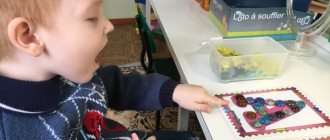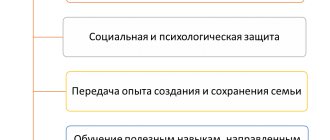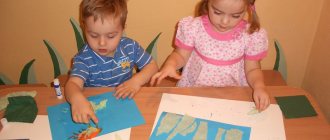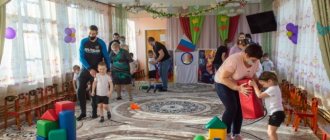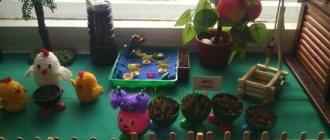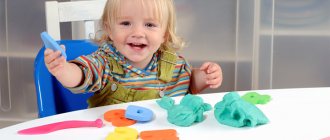Project for interaction with parents in kindergarten
Project of interaction with parents of a preschool educational institution “Journey to the land of good relations”
Author: Belobaeva Elena Valerievna MBDOU “Combined Kindergarten No. 47”, Achinsk, Krasnoyarsk Territory Project of interaction with parents (legal representatives) of pupils with a social and personal orientation.
Relevance of the project Social development in preschool childhood is aimed at developing in a child age-appropriate social competence as a basic value of a child’s personality. Family and preschool are two important institutions for the socialization of children. And although their educational functions are different, their interaction is necessary for the comprehensive development of the child. Involving parents in solving problematic problems of family education encourages them to analyze educational techniques, search for a more appropriate method of parental behavior, exercises the logic and evidence of pedagogical reasoning, and develops their sense of pedagogical tact. Analysis by parents of children's behavior helps them see their teaching experience from the outside, provides an opportunity to reflect on the motives of the child's actions, and teaches them to understand them from the point of view of his mental and age-related needs. However, there are a number of problems that do not allow ensuring an atmosphere of goodwill and comfort in communication between parent and child, namely: - the peculiarity of the modern family is associated with a reduction in free time for parents, overload at work - all this leads to a deterioration in their physical and mental condition, increased irritability, fatigue, stress; — material values dominate over spiritual ones, so children have distorted ideas about kindness, mercy, generosity, and justice. Children are marked by emotional, volitional, spiritual immaturity; — parents habitually throw out their emotions on their children, while blaming the child for both external problems and domestic troubles. The child finds himself in a situation of complete dependence on the mood, emotions and reactions of his parents, which affects his mental health. Based on the above, a project of interaction with parents with a social and personal orientation “Journey to the Land of Good Relations” has been developed. Goal: Increasing the competence of parents on issues of social and personal development of children. Objectives: - establish cooperation between the educational institution and the family; — to activate the educational skills of parents and direct them to constructive partnerships with the child; — to guide parents towards the revival of moral and ethical norms and traditions of the family way of life. Project participants: preschool educational institutions specialists, teachers, parents, children Implementation period: within a year Place of implementation: 663153, Krasnoyarsk region, Achinsk city, 24 quarter, building 13, MBDOU “Combined kindergarten No. 47”. Project type: practice-oriented Project support resources: Organizational:
The activities of project participants are regulated in accordance with the basic general educational program of preschool education of MBDOU "D/s No. 47", the annual plan and the project implementation plan.
Informational:
- scientific-methodological, fiction;
- mass media; - Internet resource. Staffing:
- administration of the preschool educational institution;
- educators; - musical director; — physical education instructor; - teacher - psychologist. Financial support:
- budget of the Institution;
- Parents' charitable funds. Logistics:
- multimedia projector, - screen, - laptop, - music center.
Expected result: 1. Creation of a system of comprehensive work with parents. 2. Psychological and pedagogical education of parents on issues of social and personal development of children. 3. Generalization of the experience of family education. Principles of interaction between the teacher and parents: - the ability to create a friendly atmosphere conducive to dialogue; — attention to the problems of parents, their subjective experiences; — ability to provide psychological assistance; — focus on stimulating parents’ self-education; - the ability to see the slightest achievements and instill confidence in success; - a positive attitude to talk with parents about any problem; — manifestation of pedagogical tact and moral and ethical standards when working with parents; - sincerely want to help in a difficult pedagogical situation; - inadmissibility of comparing the guilty child with others. When considering a conflict situation, analyze the situation itself, and not the personal qualities of the child and his parents. Forms of work with parents: - questionnaires;
— consultations; — viewing direct educational activities; - conversations; - Parent meeting; - workshop; — information sheet, reminders, recommendations; — joint events: holidays, entertainment, competitions; - Open Day; - family presentation. Project implementation stages:
Stage 1 - research
- “Do you know your child?”
— questioning; — “My child and his individual characteristics” - questionnaire - essay; - “Relationships in the family” - test - survey; — “Family traditions and norms” — survey; — “Helpline” - promotion. Stage 2 – preparatory
– processing of the received information;
— selection of visual propaganda; — study of methodological literature; — development of a plan for joint activities. Stage 3 - practical
Information block: - “Five recipes for getting rid of anger” - memo;
— “What is a culture of communication?” — information sheet; - “Personal example is the best way to instill good manners in a child” - memo; — “The authority of parents is a necessary condition for proper upbringing” — consultation; — “How to introduce children to norms of behavior” — consultation; - “Sow a habit...” - information sheet; — “The game is a school of moral behavior” — consultation; — Individual consultations at the request of parents. Practical block: - “Discussing problematic situations” - workshop (September); - “The moral law is within us” - parents’ meeting (October); — “Friendship lives among us” — open day, viewing of direct educational activities (November); — “Holiday in our house” — creative workshop (December); — “Let's talk about politeness” — round table (January); — “Young Games” — sports competitions with the participation of dads (February); — “Our mothers are always jacks of all trades” — culinary duel (March); - “Family of the Year” - competition - presentation (April): exhibition of family photographs; exhibition of joint works; filling out a family (genealogical) tree; a story about family traditions; games, competitions, performances. — Performance assessment (May). Stage 4 – final
– assessment of the effectiveness of the project. Studying parents' satisfaction with the work of an educational institution: - questionnaire method - conversations with parents. Increasing the level of activity, psychological and pedagogical culture of parents: - taking into account the participation of parents in various events; — observations; - conversations. Determining the level of activity of the teacher with parents. — use of self-assessment sheets.
We recommend watching:
Parent meeting on traffic rules in the preparatory group Creative workshop in kindergarten “Making laboratory materials with your own hands” Lesson with parents in kindergarten. Abstract Literary quiz on fairy tales for kindergarten
Similar articles:
Plan of interaction with families of children of the middle group of general developmental orientation
Methodological recommendations for drawing up an individual development program
Organization of joint thematic projects in preschool educational institutions (teachers - children - parents)
Organizing full interaction between teachers, children and parents is one of the important tasks facing the staff of preschool institutions. In order for parents to become active assistants to teachers, it is necessary to involve them in the life of the kindergarten. One aspect of this issue is the search for rational ways of interaction. What is the interaction between teacher and parents? To accurately answer this question, we turned to S. Ozhegov’s Russian language dictionary, where the meaning of the word “interaction” is explained as the mutual connection of two phenomena, mutual support.
Both the family and the preschool institution convey social experience to the child in their own way. But only in combination with each other do they create optimal conditions for a little person to enter the big world. The path to dialogue between these two social institutions is complicated by the fact that there is an imbalance in the processes of education in the family and preschool educational institutions. Today, the potential capabilities of the family are undergoing a serious transformation. Teachers note a decrease in her educational potential and a change in her role in the process of primary socialization of the child. Modern parents have a hard time due to lack of time, employment, and lack of competence in matters of preschool pedagogy and psychology. Social instability, social tension, and economic pressure have moved the educational functions of the family to second and third places, and in preschool educational institutions, education always comes first. This situation can be leveled out by including the family in the educational space of the preschool educational institution.
One of these forms of cooperation and the inclusion of parents in the educational space of preschool educational institutions is the organization of joint thematic projects in kindergarten
“Project” (Latin) “thrown forward”, “protruding”, “conspicuous”.
A project is a specially organized set of actions that has a socially significant result.
The peculiarity of joint projects in kindergarten is that the child cannot yet independently formulate a problem or determine a plan, therefore, in the educational process of a preschool educational institution, project activities are in the nature of cooperation, in which children, teachers, and parents take part.
Working in joint projects gives:
- a child can learn to pose a problem, find solutions, plan, work independently with information, be a responsible partner, and respect the opinion of the interlocutor;
- a favorable atmosphere for learning is created in the group;
- a community of children, educators and parents is created;
- children have an incentive to work and learn with pleasure and desire;
- projects allow you to quickly obtain a clear result of your activities;
The organization of joint thematic projects can be considered as a special mechanism for interaction between families and preschool educational institutions.
A preschooler cannot be the author or leader of project activities. He needs the help of adults who can understand his interests. The main organizer of joint projects with parents is the teacher. He is a source of information, a consultant, an expert.
He is the main leader of the project and subsequent research, gaming, artistic, practice-oriented activities, coordinator and partner of children and parents in solving the problem.
Stages of work on the project:
1. Goal setting: the teacher helps the child choose the most relevant and feasible task for him for a certain period of time.
2. Project development - action plan to achieve the goal:
- who to turn to for help (an adult, a teacher);
- what sources can you find information in?
— what items to use (accessories, equipment);
— what objects to learn to work with to achieve the goal.
— GCD, games and other types of children’s activities
3. Project implementation – practical part (collecting and accumulating material, completing homework, project result)
4. Summing up – presentation and definition of tasks for new projects.
The project is the 5 Ps:
- problem;
- design or planning;
- search for information;
- product;
- presentation.
As the stages of the joint project are implemented, teachers and parents help the child find means and ways to achieve the goal.
Relying on the help of adults, children seek a solution to the problem through questions to their parents, joint trips to the library, reading educational literature, and observations. Together with their parents, they are engaged in productive activities: drawing, crafting, composing.
Thus, joint collection of materials, production of attributes, games, competitions, presentations reveal the creative abilities of children, involve parents in the educational process, which naturally affects the results. Parents, participating in the implementation of the project, are not only sources of information, real help and support for the child and teacher in the process of working on the project, but also become direct participants in the educational process, enrich their teaching experience, experience a sense of ownership and satisfaction from their successes and the achievements of their child. Parents can be not only a source of information, but also a source of real help and support for the child in the process of working on a project; they can enrich their teaching experience, experience a sense of ownership and satisfaction from their successes and the successes of the child.
By implementing the project method, we cultivate an independent and responsible personality, and develop the child’s mental and creative abilities. Joint projects broaden the horizons of children and adults, fill them with creative energy, and help build relationships and cooperation between family and kindergarten. It is project activities that will help unite teachers, children and parents, teach them to work in a team, collaborate, and plan their work. And most importantly, every child will be able to express themselves, feel needed, which means that self-confidence will appear and the child’s self-esteem will increase. By participating in the project, the child feels significant in a group of peers and sees his contribution to the common cause. One of the advantages of design technology is that each child is recognized as important and necessary in the team. He sees the results of efforts at the beginning of the group, and then the entire team. The child understands that other participants in the process notice his contribution to the common cause, and therefore strives to keep up with his peers.
Thus, the introduction of joint thematic projects into the educational process contributes to the development of a free creative personality, which corresponds to the social order at the present stage and makes the educational process of a preschool organization open to the active participation of parents and other family members.
